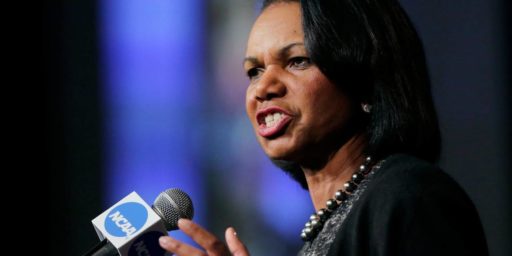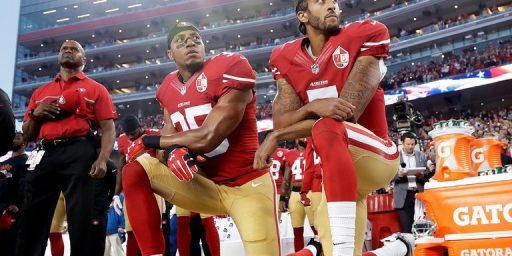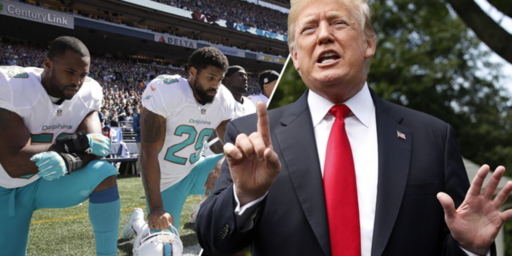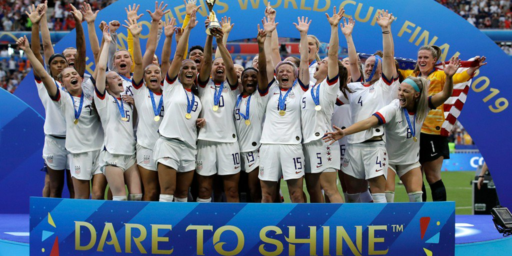Basketball With Obama
Michael Lewis has a long feature in Vanity Fair titled "Obama's Way," based on six months with the president.
Michael Lewis has a long feature in Vanity Fair titled “Obama’s Way,” based on six months with the president. This excerpt is particularly revealing:
At nine o’clock one Saturday morning I made my way to the Diplomatic Reception Room, on the ground floor of the White House. I’d asked to play in the president’s regular basketball game, in part because I wondered how and why a 50-year-old still played a game designed for a 25-year-old body, in part because a good way to get to know someone is to do something with him. I hadn’t the slightest idea what kind of a game it was. The first hint came when a valet passed through bearing, as if they were sacred objects, a pair of slick red-white-and-blue Under Armour high-tops with the president’s number (44) on the side. Then came the president, looking like a boxer before a fight, in sweats and slightly incongruous black rubber shower shoes. As he climbed into the back of a black S.U.V., a worried expression crossed his face. “I forgot my mouth guard,” he said. Your mouth guard? I think.Why would you need a mouth guard?
“Hey, Doc,” he shouted to the van holding the medical staff that travels with him wherever he goes. “You got my mouth guard?” The doc had his mouth guard. Obama relaxed back in his seat and said casually that he didn’t want to get his teeth knocked out this time, “since we’re only 100 days away.” From the election, he meant, then he smiled and showed me which teeth, in some previous basketball game, had been knocked out. “Exactly what kind of game is this?” I asked, and he laughed and told me not to worry. He doesn’t. “What happens is, as I get older, the chances I’m going to play well go down. When I was 30 there was, like, a one-in-two chance. By the time I was 40 it was more like one in three or one in four.” He used to focus on personal achievement, but as he can no longer achieve so much personally, he’s switched to trying to figure out how to make his team win. In his decline he’s maintaining his relevance and sense of purpose.
Basketball hadn’t appeared on the president’s official schedule, and so we traveled the streets of Washington unofficially, almost normally. A single police car rode in front of us, but there were no motorcycles or sirens or whirring lights: we even stopped at red lights. It still took only five minutes to get to the court inside the F.B.I. The president’s game rotates around several federal courts, but he prefers the F.B.I.’s because it is a bit smaller than a regulation court, which reduces also the advantages of youth. A dozen players were warming up. I recognized Arne Duncan, the former captain of the Harvard basketball team and current secretary of education. Apart from him and a couple of disturbingly large and athletic guys in their 40s, everyone appeared to be roughly 28 years old, roughly six and a half feet tall, and the possessor of a 30-inch vertical leap. It was not a normal pickup basketball game; it was a group of serious basketball players who come together three or four times each week. Obama joins when he can. “How many of you played in college?” I asked the only player even close to my height. “All of us,” he replied cheerfully and said he’d played point guard at Florida State. “Most everyone played pro too—except for the president.” Not in the N.B.A., he added, but in Europe and Asia.
Overhearing the conversation, another player tossed me a jersey and said, “That’s my dad on your shirt. He’s the head coach at Miami.” Having highly developed fight-or-flight instincts, I realized in only about 4 seconds that I was in an uncomfortable situation, and it took only another 10 to figure out just how deeply I did not belong. Oh well, I thought, at least I can guard the president. Obama played in high school, on a team that won the Hawaii state championship. But he hadn’t played in college, and even in high school he hadn’t started. Plus, he hadn’t played in several months, and he was days away from his 51st birthday: how good could he be?
The president ran a couple of laps around the gym, then shouted, “Let’s go!” He himself divvied up the teams so each one had roughly the same number of giants and the same number of old people. Having put me on his team, he turned to me and said, “We’ll sit you first, until we get a little bit of a lead.” I thought he was joking, but actually he wasn’t; he was as serious as a heart attack. I was benched. I took my place in the wooden stands, along with a few of the other players, and the White House photographer, the medical team, the Secret Service, and the guy with the buzz cut who carried the nuclear football, to watch the president play.
Obama was 20 or more years older than most of them, and probably not as physically gifted, though it was hard to say because of the age differences. No one held back, no one deferred. Guys on his team dribbled past him and ignored the fact he was wide open. When he drives through the streets, crowds part, but when he drives to the basket large, hostile men slide over to cut him off. It’s revealing that he would seek out a game like this but even more that others would give it to him: no one watching would have been able to guess which guy was president. As a player on the other team, who must have outweighed Obama by a hundred pounds, backed the president of the United States down and knocked the crap out of him, all for the sake of a single layup, I leaned over to the former Florida State point guard.
“No one seems to be taking it easy on him,” I said.
“If you take it easy on him, you’re not invited back,” he explained.
I thought to myself, It must be hard not to take it easy on the president.
The point guard laughed, turned to another guy on the bench, and said, “Remember Rey?”
“Who’s Rey?” I asked.
“Rey pump-faked, turned, and just connected with the president right in the mouth,” the other guy said. “Gave him 16 stitches.”
“Where’s Rey?” I asked.
“Rey hasn’t been back.”
Obama could find a perfectly respectable game with his equals in which he could shoot and score and star, but this is the game he wants to play. It’s ridiculously challenging, and he has very little space to maneuver, but he appears happy. He’s actually just good enough to be useful to his team, as it turns out. Not flashy, but he slides in to take charges, passes well, and does a lot of little things well. The only risk he takes is his shot, but he shoots so seldom, and so carefully, that it actually isn’t much of a risk at all. (He smiles when he misses; when he makes one, he looks even more serious.) “Spacing is big. He knows where to go,” said one of the other players as we watched. “And unlike a lot of lefties, he can go to his right.”
And he chattered constantly. “You can’t leave him open like that!” … “Money!” … “Take that shot!” His team jumped ahead, mainly because it took fewer stupid shots. When I threw one up I discovered the reason for this. When you are on the president’s basketball team and you take a stupid shot, the president of the United States screams at you. “Don’t be looking to the sidelines all sheepish,” he hollered at me. “You got to get back and play D!”
At some point I discreetly moved up to where I belonged, into the stands beside the guy who was operating the clock. His name was Martin Nesbitt. When I had pointed him out to Obama and asked who he was, Obama, sounding like he was about 12 years old, said, “Marty—well, Marty’s my best friend.”
Nesbitt does an extremely good impression of a man who could just barely give a shit that his best friend is the president of the United States. After the fifth game, with the president’s team up 3-2, guys started drifting toward their gym bags in the way they do when everyone thinks it’s over.
“I could go one more,” said Obama.
Nesbitt hooted. “He’s actually going to take the risk of letting this thing get tied up? That’s out of character.”
“He’s that competitive?” I asked.
“Even games we never play. Shuffleboard. I don’t know how to play shuffleboard. He doesn’t know how to play shuffleboard. But if we play, it’s like ‘I can beat you.'”
So, if you take it easy on the president, you’re not invited back. If you break the president’s face, you’re not invited back. That seems reasonable.






Not to be all “but, but, Bush” about this, but it really bothered me, as a mountain biker, that he had a “no pass” rule. I try to hang with who I can, and find out about myself that way.
I can’t wait for Glenn Reynolds demanding that Obama should resign because Rey wasn’t invited back. It’s clearly a sign of something really bad. Probably executive power misuse. Is Ray even still alive? Maybe he was sent to Gitmo? WHY IS THE LAME STREAM MEDIA IGNORING THIS!?
This is nothing. I hear that when Mitt Romney plays croquet he will totally have one of his footmen roquet an opponent’s ball clear into the prancing horse’s paddock. Jolly good fun.
See? Proof that he has thin skin.